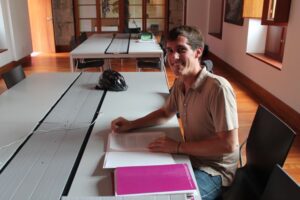
Jonathan Sherry (27 años), estudiante de doctorado de la Universidad de Pittsburgh (EEUU), acude a diario a la sede de la Fundación Juan Negrín, en Las Palmas de Gran Canaria, donde recopila información para su tesis doctoral sobre las relaciones “entre la URSS y la República en guerra”.
“De manera específica investigo el papel de los tribunales de espionaje y especiales de guardia durante la guerra, y el papel de los republicanos y socialistas, de los asesores soviéticos y del Gobierno de Negrín en esos procesos”.
Las relaciones entre Negrín y los asesores soviéticos, los juicios políticos y, en concreto, el proceso al POUM y a los anarquistas en Cataluña centran el campo de investigación del estudiante de la Universidad de Pittsburgh.
Sherry, natural del estado de Kentucky, quiso ser piloto profesional pero dificultades de índole económica le hicieron replantearse su futuro a los 19 años. “De repente estaba estudiando historia, leí mucho sobre la Europa contemporánea. Lo que más me interesó fue España y específicamente la guerra civil española”.
Cita a George Orwell y su ‘Homenaje a Cataluña’, como la llave que le indicó el camino. “Fue el primer libro que leí sobre la guerra civil, me interesó mucho”.
Frente a otros archivos históricos de Madrid, Barcelona y Salamanca, Sherry apunta que los fondos de Juan Negrín López son los únicos donde ha podido hallar “documentos de los niveles más altos de la Administración” del gobierno republicano.
“Es muy importante para mí investigación, porque aquí se pueden consultar la correspondencia entre miembros del Gobierno de Negrín y los comunicados con los asesores soviéticos, gente del partido comunista, del socialista … Por eso estoy aquí”.
“He consultado otros archivos en otras ciudades españolas, pero éste es fundamental”, señala el joven investigador antes de poner de manifiesto que gran parte de los papeles del fondo del estadista grancanario son inéditos.
“Solo unos pocos historiadores han visto documentos que son muy importantes para llegar a un entendimiento completo del papel de Negrín y de su Gobierno”, agrega.
Sherry constata la existencia de “muchos mitos” sobre el aspecto de la guerra que pretende desentrañar. “Muchos historiadores de Estados Unidos e Inglaterra han aducido que Negrín fue un estalinista y nada más, pero, como dijo Enrique Moradiellos, esto simplemente no es verdad. En mi opinión, tampoco. Se ha escrito mucho sobre la represión política de Negrín, sobre todo en los libros escritos durante la Guerra Fría en una clima de anticomunismo. Por este motivo todavía persisten muchos mitos sobre este asunto”
“Fundamentalmente, mi objetivo es utilizar el proceso judicial para comprender la relación entre el Gobierno de Negrín y su aliado soviético, y también como un medio para trazar el desarrollo de la historiografía sobre esa relación durante la Guerra Fría.”
————————–
Jonathan Sherry: from Kentucky to Vegueta
Jonathan Sherry (27 years old), PhD student at the University of Pittsburgh (USA), comes daily to the headquarters of the Fundación Juan Negrín in Las Palmas de Gran Canaria, where he is collecting information for his doctoral thesis about “the relationship between the USSR and the Spanish Republic at war.”
“More specifically, I’m researching the Spanish Espionage Tribunals and Special Guard Courts and the role of republicans, socialists, Soviet advisors, and the Government of Negrín in these tribunals.”
This student of the University of Pittsburgh’s work focuses primarily on the relationship between Negrín and Soviet advisors with regard to political trials, especially the prosecution of the POUM and the anarchists in Cataluña.
Sherry, a native of the state of Kentucky, initially planned to be a professional pilot, but he reconsidered his future at the age of 19 because of the high costs of pilot school. “All of the sudden, I was studying history, reading a lot of books about modern Europe, and Spain always interested me most, especially the Spanish Civil War.
He cites George Orwell and his memoir, “Homage to Catalonia,” as the key text which led him on his path. “It was the first book that I read about the Civil War, and it sparked my interest.”
Unlike many other historical archives in Madrid, Barcelona, and Salamanca, Sherry points out that the files of Juan Negrín López are among the only ones in which you can find “documents of the highest levels of administration” of the Republican Government.
“It’s very important for my research becuase you can find correspondence between members of Negrín’s government, its communication with Soviet advisors, Spanish Communists, Socialists… that’s why I’m here.”
“I’ve consulted archives in other Spanish cities, but this one is essential,” the young researcher pointed out, before emphasizing that a large part of the papers of the great Canarian stateman are unedited and not catalogued.
“Only a few historians have seen these documents, which are essential for gaining a complete understanding of the role of Negrín and his Government.”
Sherry claims that there are “many myths” about the war that he intends to unravel. “Many historians in the United States and the UK claim that Negrín was a Stalinist and nothing more, but as Enrique Moradiellos has said, it’s just not true. I couldn’t agree more. Much has been said about Negrín’s political repression, above all in books written in the anticommunist climate of the Cold War. This is one reason why there are still many myths about the subject.”
“Fundamentally, then, my purpose is to use the judicial process as a lens for understanding the complex relationship between the Spanish Republic and its Soviet ally, and for tracing how the history of that relationship developed during the Cold War.”